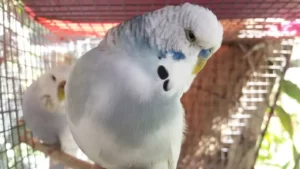Budgie birds are one of the most popular bird species kept as pets. They’re small, relatively easy to care for and make great companions. But how long does a budgie live? The average lifespan of a budgie is 5-8 years, but some may live 10+ years with proper care. The delightful little budgies might be tiny, but that doesn’t mean they’re short-lived.
What is the life cycle of a budgie?
The life cycle of a budgie is relatively short, with most budgies living between 5 and 10 years. However, some budgies have been known to live for 20 years or more. Budgies reach sexual maturity at around 6 months of age.
At this point, they will start to mate and produce offspring of their own. Budgies typically lay between 2 and 8 eggs per clutch, with the eggs taking 18 to 21 days to hatch. Once hatched, the chicks will stay with their parents for 4 to 8 weeks before leaving the nest to start their own lives.

What is the key to a long life for your budgie?
The key to a long and healthy life for your budgie is providing them with a clean and safe environment, a nutritious diet, and plenty of opportunities to exercise. By taking good care of your budgie, you can help them enjoy a long and happy life.
Diet:
Budgies are small birds with high metabolisms, so they require a diet that is high in protein and fat. A good diet for a budgie should consist of:
- Fresh vegetables and fruits: Offer your budgie a variety of fresh vegetables and fruits every day. Some favorites include broccoli, carrots, spinach, apples, and berries.
- Commercial budgie food: In addition to fresh foods, you should also provide your budgie with a high-quality commercial budgie food mix. Look for a mix that contains seeds, pellets, and nuts.
- Water: Fresh, clean water should be available at all times. Change the water daily and clean the water dish often.
Exercise:
Budgies are active birds and need plenty of opportunities to exercise. A good way to provide exercise for your budgie is to set up a large cage with plenty of toys and perches. Budgies also enjoy playing outside their cage, so consider setting up a play area for your budgie to enjoy.
Clean and safe environment:
It’s important to keep your budgie’s environment clean and safe. This means cleaning their cage regularly and making sure that there are no harmful objects or chemicals around. It’s also essential to provide your budgie with a variety of toys and perches to keep them entertained and mentally stimulated.
How can you tell if my budgie is healthy?
There are a few signs you can look for to gauge your budgie’s health:
- Bright, shiny feathers: Healthy budgies have bright, shiny feathers. If your budgie’s feathers are dull or dry, it could be a sign of poor health.
- Clear eyes: Budgies should have clear, bright eyes. Your budgie’s eyes are red or cloudy, it could be a sign of illness.
- Active and playful: Healthy budgies are typically active and playful. If your budgie is lethargic or inactive, it may be a sign of health problems.
- Good appetite: A healthy budgie will have a good appetite and eat regularly. If your budgie isn’t eating well, it could be a sign of illness.
If you notice any of these signs, it’s important to take your budgie to the vet for a check-up. By catching health issues early, you can help your budgie live a long and healthy life.
How do most budgies die?
Most well-kept budgies die from old-age-related causes such as organ failure or disease. However, there are a few other ways that budgies can die, such as:
- Respiratory issues: Budgies are susceptible to respiratory issues, which can be caused by everything from bacteria to viruses. If not treated early, respiratory problems can be fatal.
- Injuries: Budgies are fragile birds and can easily injure themselves. Common injuries include broken bones and head trauma. In severe cases, injuries can lead to death.
- Heat stroke: Budgies are very sensitive to heat and can easily succumb to heat stroke if they get too hot. Symptoms of heat stroke include panting, drooping wings, and lethargy. If you think your budgie has heat stroke, cool them down immediately and take them to the vet.
- Predation: In the wild, budgies are often preyed upon by larger birds and animals. If kept as pets, budgies are not typically at risk of predation but can die from other causes such as injuries or disease.

Do male or female budgies live longer?
There is no scientific evidence to suggest that one sex lives longer than the other. However, some budgie owners believe that female budgies tend to have longer lifespans.
This may be due to the fact that females are typically smaller than males and therefore have less body mass to support. Additionally, female budgies are less likely to engage in risky behaviors than their male counterparts.
How to know the age of a budgie?
There are a few ways to know the age of a budgie:
- Check the eyes: The easiest way to tell the age of a budgie is to check its eyes. Baby budgies have blue eyes, which turn brown as they reach adulthood.
- Look at the plumage: Another way to estimate the age of a budgie is to look at its plumage. Baby budgies have soft, downy feathers, while adult budgies have sleek, glossy feathers.
- Check the feet: The third way to tell the age of a budgie is to check its feet. Baby budgies have small, undeveloped feet, while adult budgies have large, fully-grown feet.
If you’re unsure of the age of your budgie, it’s best to take them to the vet for a check-up. The vet will be able to give you a more accurate estimate of your budgie’s age.
Conclusion
The average lifespan of a budgie is around 7 years. However, with proper care and diet, they can live up to 10-12 years. Budgies are generally healthy birds, but there are some things you can do to help keep them that way. Feeding your bird a high-quality pellet diet is one of the most important things you can do for their health. Budgies also enjoy fresh fruits and vegetables, as well as seeds and nuts. Provide plenty of clean water and make sure your bird’s cage is cleaned regularly. Keep an eye on your budgie for any signs of illness or distress, and take them to the vet if necessary.